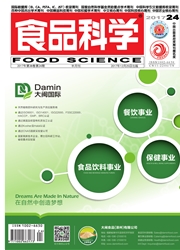

 中文摘要:
中文摘要:
目的:研究灵芝肽(Ganoderma lucidum peptides,GLP)在体外对人肝癌HepG2细胞增殖抑制及诱导凋亡的作用。方法:HepG2细胞用含不同浓度GLP培养基培养12、24、36、48、60h,GLP分为5个浓度梯度,分别为0.25、0.5、1、2、4mg/ml,采用噻唑兰(methyl thiazolyl tetrazolium,MTT)法观察细胞生长抑制作用,用可见光显微镜、荧光显微镜观察细胞形态学变化、激光共聚焦(laser scanning confocal microscopy,LSCM)观察细胞内钙离子浓度的变化。结果:MTT法显示灵芝肽能显著抑制人肝癌HepG2细胞的生长,且存在浓度及时间依赖性。镜下可见细胞出现典型凋亡细胞形态学改变:细胞染色质浓缩,细胞体积缩小、核固缩深染、细胞膜出泡、凋亡小体形成;LSCM观察到胞内钙离子浓度明显增加。结论:0.25~4.0mg/ml的GLP体外可显著抑制人肝癌HepG2细胞增殖,存在量效关系和时效关系,能诱导人肝癌HepG2细胞凋亡,并且提示细胞内钙离子浓度的升高可能是细胞凋亡的机制之一。
 英文摘要:
英文摘要:
Growth inhibition effects of Ganoderma lucidum peptides (GLP) on human hepatoma HepG2 cells were investigated in vitro. The HepG2 cells were incubated with varying concentrations (0.25, 0.5, 1, 2 and 4 mg/ml) of GLP for 12, 24, 36, 48 and 60 h. Anti-proliferation activities of GLP were evaluated by methyl thiazolyl tetrazolium (MTT) colorimetric assay. Morphological changes of treated HepG2 cells were observed under visible light microscope and fluorescence microscope, and changes of intracellular Ca^2+ concentration were analyzed by laser scanning confocal microscopy (LSCM). The results showed that there is significant inhibition against the growth of HepG2 cells in a dose- and time-dependant manner. Morphological alterations can be found including cell shrinkage, plasma membrane blebbing, nuclear condensation and formation of apoptotic bodies. The concentration of intracellular Ca^2+ remarkably increases after treatment of GLP as compared with control by LSCM.
 同期刊论文项目
同期刊论文项目
 同项目期刊论文
同项目期刊论文
 期刊信息
期刊信息
